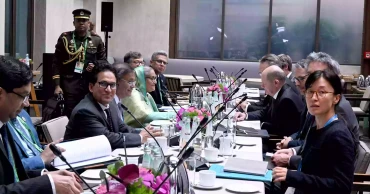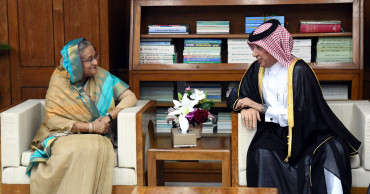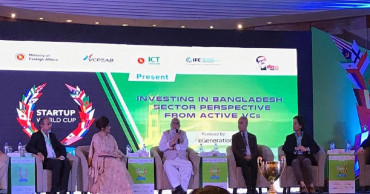Skilled Manpower
Lalmonirhat TTC rebounds to build a new generation skilled workers
With barely a third of its sanctioned workforce, the Lalmonirhat Technical Training Centre (TTC) is pressing ahead—quietly but resolutely—to keep its skill-building mission alive.
Despite having 81 approved posts, only 39 are currently filled. The challenge deepened when 16 officers and staff were transferred following an institutional merger, leaving the centre to operate with just 23 personnel. Yet, training continues without interruption, thanks to determined staff and revived leadership.
A recent UNB visit found the centre bustling once again after years of stagnation. A total of 412 trainees are now enrolled across two shifts, receiving instruction in 13 courses.
Established in 2006 beside the Haribhanga air base, around three kilometres from Lalmonirhat town, the TTC was created to produce skilled manpower under the Bureau of Manpower, Employment and Training (BMET).
Read more: ADB, Bangladesh sign $150m deal to boost technical training for employment creation
Today, it prioritises high-quality technical education tailored to the needs of both domestic industries and overseas labour markets, including the Middle East, Europe and the United States.
Under a new government initiative to boost skill development, the centre is adopting updated programmes designed to prepare competitive workers for international employment.
Trainees are provided with a supportive learning environment, and the centre assists in arranging employment after course completion, an approach that has significantly increased interest among local youth.
The TTC offers courses of two, three and six months, along with a 30-day housekeeping programme for domestic workers heading abroad. There are also specialised training options for SSC graduates to encourage self-reliance.
Read more: Ecnec nods setting up 50 technical training centres
Driving instructor and trade in-charge Kamruzzaman said the centre has evolved into a meaningful platform for producing skilled human resources.
He acknowledged that past leadership was marred by irregularities, which stalled progress and damaged the institution’s reputation.
“Under the new leadership of Principal Engineer Md Ainul Haque, the quality of training has improved considerably,” he said.
Senior Instructor (Electrical) Shri Jageshwar Barman said the TTC is now focused on producing technically competent workers capable of contributing both at home and overseas. Courses such as mobile phone servicing have been modernised and made more practical, he added.
Read more: Crisis of care: Manpower shortage cripples Chuadanga Sadar Hospital
Trainees Saiful Islam and Habibur Rahman, who are preparing for overseas employment, praised the sincerity of the instructors and the harassment-free learning environment.
Principal Engineer Md Ainul Haque, who recently assumed charge, said the centre had long operated in a fragile state but has now regained stability and is conducting regular training programmes.
“With only 23 staff against 81 approved posts, we face limitations. But I am confident that our trainees will acquire the skills necessary for self-employment and overseas work as capable, qualified professionals,” he said.
2 months ago
Outcomes of Hasina-Scholz bilateral talks on sidelines of MSC 2024
Germany and Bangladesh have agreed it is best to end the Russia-Ukraine war and the attack on Gaza.
The consensus came when Prime Minister Sheikh Hasina and German Chancellor Olaf Scholz held bilateral talks on the sidelines of the Munich Security Conference 2024 on Saturday (February 17, 2024).
"A detailed discussion was held between the Bangladesh Prime Minister and the German Chancellor about ending wars, particularly the Russia-Ukraine war and attack on Gaza," Foreign Minister Dr Hasan Mahmud said, while briefing media regarding the outcome of the meeting between the two leaders.
The meeting between the two leaders was held at Hotel Bayerischer Hof, the conference venue, here, this afternoon.
Both the leaders, Bangladesh Premier and the Chancellor of Germany, agreed that none will be benefited through war.
At meeting with Zelenskyy PM Hasina calls for ending Russia-Ukraine war
Quoting the German Chancellor, Dr Hasan Mahmud said, "The only process of establishing peace is to stop war."
The prime minister called upon the German Chancellor to make investment in various sectors of Bangladesh including the IT sector as Germany is advanced in high technology industries.
Mentioning that Bangladesh is establishing 100 economic zones across the country, Sheikh Hasina said,"Germany can invest in Bangladesh."
The Prime Minister invited the German Chancellor to visit Bangladesh and he accepted the invitation.
Sheikh Hasina recalled the contribution of Germany in rebuilding independent Bangladesh after the Liberation War.
The two leaders also discussed exporting more Bangladeshi products to Germany as it is the highest exporting country from Bangladesh to the EU.
Bangladesh and India need to increase use of their currencies to boost trade: PM Hasina tells Jaishankar
They also talked about sending skilled Bangladeshi manpower to Germany as the country is welcoming skilled labour from around the globe.
During the bilateral meeting held after a long time in a very warm environment, Olaf Scholz again congratulated Sheikh Hasina on her reelection as Bangladesh prime minister for the fifth term and fourth in a row.
Earlier in the morning, Germany Federal Minister for Economic Cooperation and Development called on the Bangladesh PM at the Conference venue here.
During the meeting, she offered Germany a dedicated place for investment in economic zones being set up across the country. Senior Secretary of Foreign Affairs Masud Bin Momen and Ambassador to Germany Md Mosharraf Hossain Bhuiyan, were present, among others.
Sheikh Hasina arrived in Germany to attend three-day MSC 2024 on February 15 evening.
Read more: PM Hasina meets German Chancellor in Munich, discusses bilateral issues
2 years ago
PM urges the youth to acquire skills to become entrepreneurs
Prime Minister Sheikh Hasina on Sunday said her government is focusing on developing skilled manpower to transform the country’s demographic advantage into dividends.
She said this while delivering her inaugural speech at the first meeting of the Governing Board of the National Skill Development Authority (NSDA) at her office (PMO).
Each year in Bangladesh, up to 22 lakh young people arrive in the labour market, she mentioned stressing the need for providing them training to hone their skills so they turn into entrepreneurs rather than only looking for jobs.
The premier said that the government wants to accelerate country’s progress towards achieving the Vision 2041 utilising the demographic dividend.
Also read: PM: Bangladeshi investors can set up fertilizer factories in Uzbekistan
She said that the youth of the country must be developed as skilled manpower.
“As the world is evolving continuously in technology, our aim is to build the future generations as the skilled hands to cope with up the changes,” she said.
She said Bangladesh having a huge number of young people has a demographic advantage over many countries of the world which are becoming lands of old people.
The PM said her government wants that the youth utilise their potentials in the world market as skilled manpower.
Also read: PM: Useless Ukraine-Russia war benefitting only arms producers
“We want that future generations of the country will be equipped with modern technology-based knowledge. We want to create skilled manpower keeping the fourth industrial revolution in our mind,” she said.
Hasina put emphasis on training the manpower keeping in mind the demand in the world market.
She said that Bangladesh wants investment from home and abroad in which skilled manpower will play a key role.
She reiterated her call to reduce the country’s dependency on the remittance from the expatriates for foreign exchange reserves.
“We have to increase and diversify our production. We have to expand our export basket,” she said.
She asked the officials to search for new markets and find out their demands so Bangladesh can make export products accordingly.
“We have to find out our way for producing new items for international market,” she said.
She also advised Bangladeshi businesspeople to look for opportunities to invest abroad.
“Not only we will invite investment, we also can invest in other countries. For all these we need skilled manpower,” she said.
She urged the young generation to acquire skills in various fields – instead of just getting certificates - so they can start their own enterprises and create jobs for others.
She said that a good number of youths run after jobs after having certificates from their educational institutions.
“We want that the young generation will be made a skilled workforce,” she said.
The prime Minister vowed to develop Bangladesh as a prosperous country through implementing the programmes undertaken by her government overcoming all the obstacles.
She mentioned that works on developing the national skill portal is progressing aimed at promoting countrywide skill development as well as for coordination of all the information on training about skills.
The PM said that training on quality innovative skill development has been ensured to develop the manpower of the country to meet the demands in domestic and international labour markets.
Referring to the activities of the NSDA, Hasina hoped that it will undertake necessary measures to improve living standard of the common people and work for establishing a prosperous Bangladesh.
She said the NSDA will also play its role to remove the existing negative attitude in the society about skill development training.
She said the 21st century is witnessing the creation of new professions on the basis of the demand of modern industries due to 4th industrial revolution.
She mentioned that new sectors like E-commerce, cloud computing, robotics, block chain, artificial intelligence, nano technology and internet of things are becoming important day by day.
PM Hasina said the government is currently facing various challenges like the impact of corona pandemic and Ukraine war and consequent sanctions from the USA and the EU on Russia.
She mentioned that her government has been implementing the 8th five-year plan to materialize the 2021-2041 perspective plan and achieve sustainable development goals like MDGs.
Education Minister Dipu Moni, Finance Minister AHM Mustafa Kamal, Industries Minister Nurul Majid Mahmud Humayun, Prime Minister’s Private Industry and Investment Adviser Salman Fazlur Rahman, State Minister for Labour Begum Monnujan Sufian, State Minister for Public Administration Farhad Hossain, Cabinet Secretary Khandker Anwarul Islam, Prime Minister’s Principal Secretary Ahmad Kaikaus, PM's Press Secretary Ihsanul Karim and FBCCI President Md. Jashim Uddin, among others, were present.
3 years ago
Govt focuses on digital and vocational education to build skilled manpower: Official document
The government has prioritised vocational and digital education at secondary and higher levels in a mid-term plan that seeks to create jobs and skilled manpower, according to an official document.
The plan (FY2021-22 to FY2023-24) envisages using science and technology education as a key strategy for development and poverty alleviation.
Apart from expanding vocational education the plan seeks to develop necessary infrastructure for digital education.
It also underscores the need for increasing the financial opportunities for teachers and encouraging activities related to creative talent exploration.
To this end, according to an official document, following the 8th Five Year Plan, SDGs 2030 and Vision 2041, appropriate activities and projects are being taken by ensuring quality higher education in all fields, encouraging students to do research, ensuring information technology based education, expansion of science based education, encouraging women in higher education, reducing the dropout rate, etc. as set under the National Education Policy 2010.
The objectives are to improve the overall quality of education, eliminating inequalities in education, improving quality and expanding education.
The document said that the government is currently implementing the 'Secondary Education Development Program'.
Activities under this include- expansion of infrastructure and setting up of new infrastructure with the help of existing development projects to enhance the capacity of secondary and higher secondary education, setting up of Upazila Training and Resource Centers under integrated education information management program, expansion of MPO schemes in private schools, provision of scholarships for outstanding students, and training of teachers.
During the COVID- 19 transition, online classes at secondary and higher secondary levels and teaching on important subjects on television under the title of 'My school in my house' have been introduced.
The Technical and Madrasa Education Division has placed emphasis on job-oriented technical and vocational education to facilitate the development of skilled human resources.
Some steps have already been taken to expand technical and vocational education, ensure job-focused education, and attract the general public towards technical and vocational education, said the document.
For example, projects for making computer/ technical education compulsory, organizing skill competitions, setting up technical schools and colleges in 329 upazilas along with the existing 100 technical schools and colleges, setting up women's polytechnics in 4 divisional cities, and setting up 4 engineering universities in 4 divisions are ongoing.
The ministry of primary and mass education has taken multifaceted initiatives to ensure quality and universal primary education, and has adopted and implemented a number of development activities.
For example, the ministry has nationalised 26,193 private primary schools.
It has started using mobile banking for stipends to about 14 million students across the country by making payment to their mothers on their mobile phones.
Further, infrastructure of government primary and modernised primary schools has been developed, free textbooks are distributed, and computers and multimedia are provided in schools.
In addition, during the COVID-19 pandemic, the government has started broadcasting "Learn at Home" lessons on television to keep students focused on lessons, and lessons are being broadcast on radio and community radio for students in remote areas.
In the medium term, the ministry will provide quality pre-primary and
primary education, basic education, ICT, English, sub-cluster training to teachers.
One of the main objectives of the ministry of science and technology is to build a science and technology-minded nation.
The ministry has undertaken research activities on, and formulated
policies and laws related to, science and technology.
In the medium term, as per the document, the main development priorities of the ministry will be providing fellowships in MS, PhD and post-doctoral courses at home and abroad for higher education in science, completion of various feasibility studies for construction of nuclear power plants in southern Bangladesh.
It also included providing world-class specialised library services for students and researchers, discovering low-cost tide and web power generation methods.
The other priorities are developing infrastructure and human resources for marine resource research, improving the quality of industrial products, and ensuring the quality of food and food products.
4 years ago
Thakurgaon seals border areas to contain Covid
The border areas of Thakurgaon have been sealed off in the wake of a sudden spike in Covid-19 cases in the district, officials said on Thursday.
Border Guard Bangladesh (BGB) personnel have been asked to step up vigil along the border with neighbouring India to prevent the spread of the Indian Covid-19 variant in this country, according to Lt Colonel Md Maksud, the commanding officer of BGB-50 Thakurgaon Battalion.
Read: Bangladesh’s frontier districts brace for Covid ‘catastrophe’: Experts
Deputy Commissioner KM Kamruzzaman said the bordering areas have been sealed off so as to prevent the transmission of the Indian variant of Covid-19.
According to sources, as many as 36 people in the district tested positive for Covid-19 between May 28 and June 2.
Thakurgaon Civil Surgeon Dr Mahfuzar Rahman Sarkar said that 1,705 people have tested positive for Covid-19 to date, and of them, 1,570 people have recovered.
Read: Covid protocols go for a toss at Sonahat Land Port
Some 36 people have died so far from the virus in the district.
Already a 50-bed corona unit has been opened at Sadar Hospital in the district and an isolation ward at upazila health complex has been prepared for treating Covid-19 patients, he said.
Meanwhile, sources said a liquid oxygen plant set up at Sadar Hospital five months ago is yet to be made operational due to a shortage of manpower.
However, health authorities said the oxygen plant will start functioning from this month only.
Read:Covid-19: Strict restrictions imposed in Rajshahi, parts of Khulna, Naogaon
"A ventilator is also lying unused at Sadar Hospital due to a lack of skilled manpower," said Dr Nadirul Aziz Chapal, a supervisor at the hospital.
"If the Indian Covid variant is detected here, it would be really tough for us to tackle the situation," he said.
4 years ago
Revamped education policy to focus on e-learning : Dipu Moni
Education Minister Dipu Moni on Saturday revealed the government has taken up an initiative to formulate a new education policy for the country, in which e-learning will receive greater priority.
5 years ago
Bangladesh, Hungary to bolster ties in nuclear energy, training
Bangladesh and Hungary on Thursday agreed to enhance cooperation in the field of nuclear energy and required training for skilled manpower.
5 years ago
Export skilled manpower to reduce vulnerabilities: Experts
Speakers at a webinar in the capital on Monday stressed the importance of exporting skilled manpower, aiming to reduce their vulnerabilities in their host countries as many have been arbitrarily repatriated amid the Covid-19 pandemic recently.
5 years ago
Qatar to hire skilled manpower from Bangladesh, its minister tells PM
Visiting Qatar State Minister for Foreign Affairs Soltan bin Saad Al-Muraikhi on Sunday said their country wants to hire skilled manpower like physicians and engineers from Bangladesh.
6 years ago
No alternative to skilled manpower to face 4IR: Salman
Prime Minister’s Private Industry and Investment Adviser Salman F Rahman on Saturday said there is no option but to create skilled manpower in Bangladesh to face the 4th Industrial Revolution (4IR).
6 years ago



.jpg)



.jpg)







